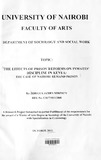| dc.description.abstract | The main objective of this study was to find out the effect of reforms on inmate discipline in Kenya. It has been observed that reforms are meant to make effective rehabilitation function, but they have brought the challenge of increased inmates’ indiscipline where acts like abuse of drugs and substances, fights and bulling of weak inmates by fellow inmates, conning of the public through mobile phones, sodomy, quarrels and verbal abuse between inmates, fights and quarrels with the prisons stafT, escapes from custody, riots and food boycotts are now common in prison institutions.
The study had four specific objectives which included finding out the extent of inmates compliance to prison rules and regulations, how reforms has affected inmates’ perception of discipline and relationship with Prison officers, inmates’ preparation for the reforms before implementation, manifestation of inmates discipline . The research questions were derived from these specific objectives.
The research adopted descriptive research design. The target population of the study was prison officers and the inmates at the Nairobi remand prison. Simple random sampling was used to sample 40 inmates from the population of 400 who had served between pre and post reform period and 30 prison officers were also sampled in the study. The questionnaires and interview guide was used to collect the data. The questionnaire was administered to inmates and the prisons officers. The interview guide was used to interview the key informants.
The data was coded and grouped according to the objectives of the study. The data was then summarized in frequencies, percentages and then presented into tables, pie charts and graphs. Then interpretation was made based on the frequencies and the percentages. The findings reveal that 53% of the prison staff indicated that compliance with prison rules and regulations among the inmates was bad, because the inmates felt that they are protected by the laws. I he study also found that the reforms had enabled the inmates to know their rights and obligations unlike previously. This was indicated by 65% of the respondents
The study therefore concluded that there was increase of indiscipline cases in the reform period and acts of indiscipline are unique. The study made several recommendations based on findings of the study which included factors responsible for increase of indiscipline must be eradicated e.g. congestion. The backlog of inmates pending cases in courts should also be concluded as soon as possible. | en_US |



